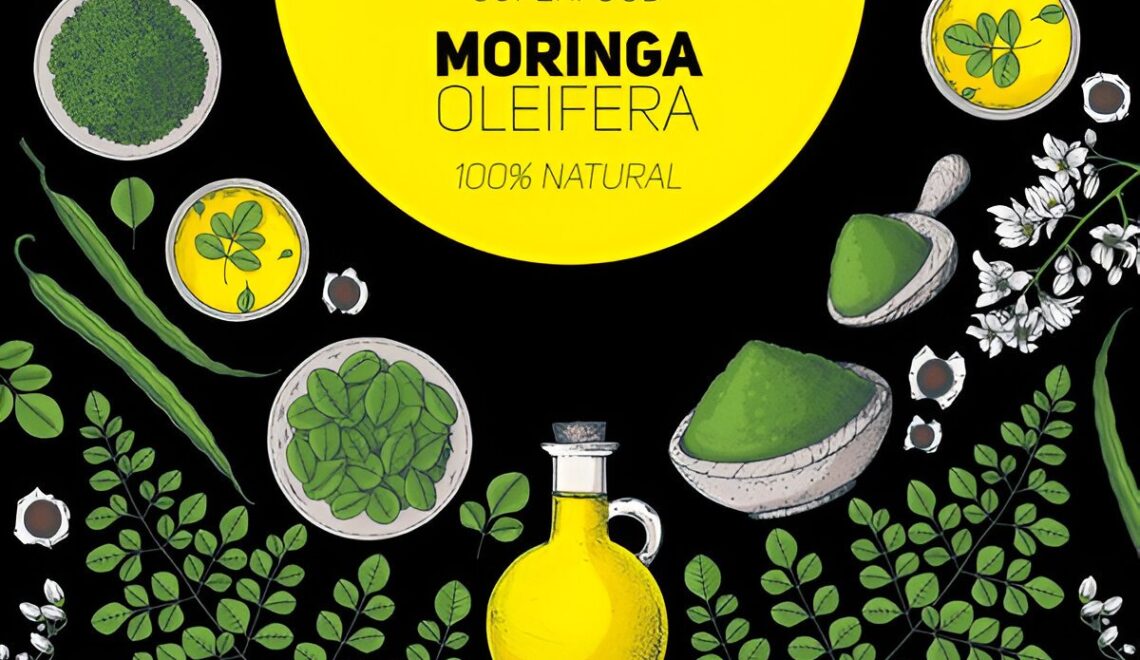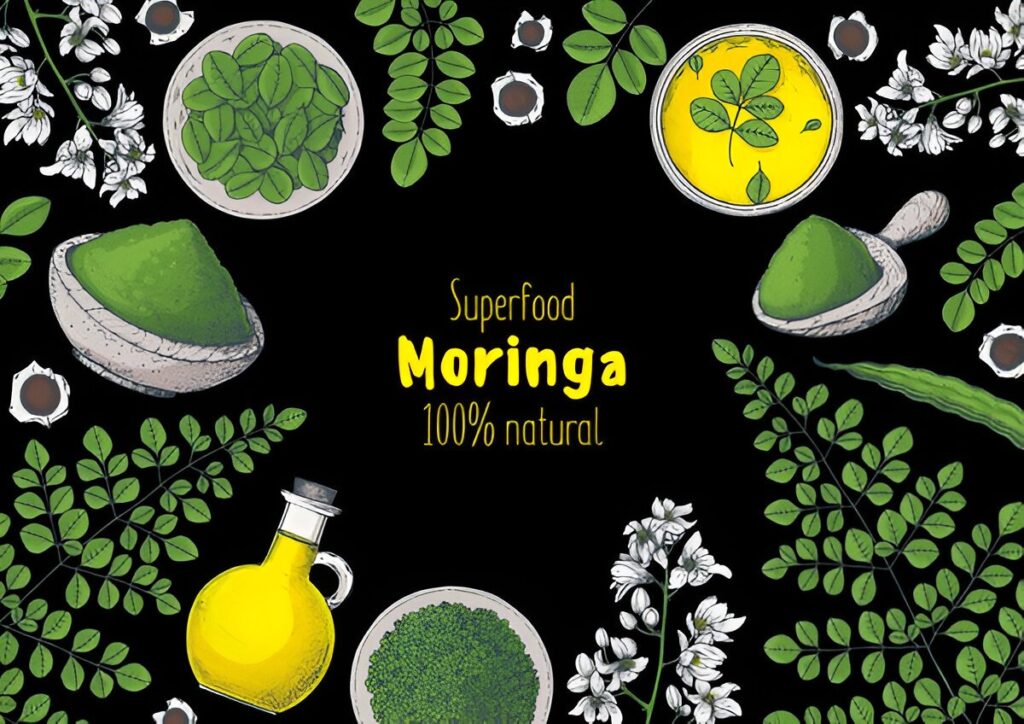Moringa Breastfeeding: A Nutritional Powerhouse for New Mothers

Moringa breastfeeding offers a natural and effective way for new mothers to enhance their nutritional intake while supporting lactation. Known as a nutritional powerhouse, moringa is rich in essential vitamins, minerals, and antioxidants that can significantly boost milk supply and improve overall health.
By incorporating moringa into their diet, breastfeeding mothers can ensure they provide the best nourishment for their babies, while also benefiting from increased energy and vitality. Discover how moringa breastfeeding can transform your postpartum journey, providing both you and your baby with the nutrients needed for optimal growth and development.
Understanding Moringa and Its Benefits
Moringa oleifera, commonly known as the drumstick tree, holds the potential to revolutionize maternal health and wellness.
This exceptional plant, also affectionately dubbed as a “miracle tree,” is lauded worldwide for its impressive nutrition, boasting an extensive range of essential amino acids, vitamins, and minerals that are vital for maintaining optimal health. Its leaves contain more vitamin C than oranges, more calcium than milk, and more potassium than bananas, contributing to its acclaim and extensive use in numerous cultures.
Nutritionally, Moringa offers a compelling combination of macro and micronutrients, revered for centuries for its therapeutic properties. By incorporating Moringa into daily nutrition, nursing mothers can leverage its high iron content—which supports fatigue reduction—and enhance overall energy levels and vitality.
For breastfeeding mothers, Moringa’s potent nutrients provide solid support to amplify lactation and fortify breast milk with crucial nutrients that aid an infant’s development. As a natural galactagogue, Moringa not only promotes milk production but also enriches the quality of breast milk, ensuring that new mothers can confidently meet their infants’ nutritional needs. With Moringa, you harness nature’s gift to prioritize both maternal health and infant well-being, seamlessly harmonizing the experience of motherhood.
Why Moringa is Ideal for Breastfeeding Mothers

Moringa is a remarkable resource for mothers.
The nutrient density of Moringa is incredibly beneficial for lactating women. This plant provides an array of essential nutrients that are critical during breastfeeding, helping to replenish maternal stores that might be depleted post-pregnancy. Meanwhile, Moringa’s impact on enhancing milk supply can empower mothers, bolstering confidence as they navigate the rewarding journey of nurturing their newborns.
Moringa is renowned for its lactation-enhancing properties.
These benefits are attributed to – not only the plant’s impressive nutritional profile but also various phytochemicals present in the leaves – which have demonstrated scientifically-backed galactagogue effects.
For mothers embracing Moringa as part of their regimen, incorporating such a nutrient powerhouse offers an inspiring pathway for ensuring both personal vitality and infant health. The commitment to nurturing your child with enriched breast milk, fostered by Moringa’s support, provides a solid foundation for early childhood development, securing a robust and healthy beginning.
Nutritional Profile of Moringa
Moringa oleifera, often referred to as the “Miracle Tree,” offers a remarkable array of nutrients that can be incredibly beneficial for breastfeeding mothers. This powerhouse of nutrition stands as a beacon of wellness, providing essential vitamins, minerals, and proteins.
Its leaves are rich in key vitamins such as A, C, and E, fortified with the minerals calcium and potassium.
Furthermore, Moringa supplies a substantial amount of iron, an essential component for nursing mothers who often require higher iron intake postpartum.
This remarkable plant also boasts an impressive concentration of amino acids necessary for the synthesis of proteins, fundamental for both maternal and infant development.
Moringa’s antioxidant-rich profile provides an invaluable source of health benefits, safeguarding the body from oxidative stress and supporting a strong immune system. In holistic health circles, Moringa’s potency in enhancing physical rejuvenation is celebrated.
Ultimately, tapping into Moringa’s powerful nutrient spectrum is an empowering choice for nursing mothers. By integrating this superfood into their diet, mothers can ensure they are meeting their nutritional needs while offering their infants a healthy start.
How Moringa Boosts Milk Supply
Moringa’s potent lactogenic properties, a treasure trove of nutritional abundance, make it a valuable ally for nursing mothers. Rich in essential vitamins and minerals, Moringa stands out as a natural enhancer, elevating milk production and enriching its nutritional quality.
For centuries, the effectiveness of Moringa in boosting milk supply has been heralded as a “galactagogue phenomenon.” This term is used to describe herbs that naturally stimulate lactation, providing an invaluable resource for breastfeeding women. When incorporated thoughtfully into daily meals, the impact of Moringa, through its diverse nutrient profile, can be notably profound, presenting a holistic approach to maternal nourishment.
Mechanisms Behind Milk Production Enhancement
The remarkable attributes of Moringa underscore its potential to naturally augment lactation among nursing mothers.
Moringa is packed with phytoestrogens that mimic estrogen, which is crucial for milk production.
The secret to Moringa’s ability to enhance milk production lies in its rich concentration of essential nutrients such as calcium, iron, and vitamins A, B, and C. These nutrients play a critical role in promoting optimal milk synthesis. Furthermore, Moringa’s inherent anti-inflammatory properties pave the way for a healthy postpartum recovery, enhancing overall well-being during the breastfeeding journey.
In addition to its nutritional prowess, Moringa fosters a holistic environment for effective milk production by boosting blood circulation and stimulating the mammary glands naturally. This multifaceted support makes Moringa not just a supplement, but an integral component of maternal health, encouraging both robust lactation and maternal vitality.
Scientific Studies Supporting Moringa’s Effectiveness
Scientific exploration into Moringa’s potential for enhancing lactation has yielded promising evidence supporting its use among breastfeeding mothers.
In 2016, researchers conducted a clinical trial examining Moringa’s impact on lactation. The study involved mothers who consumed Moringa daily and noted a significant increase in milk production compared to those who did not.
This is not the only study that validates Moringa’s efficacy in promoting lactation. The collective data from various academic circles underline the herb’s potency, solidifying its position as a valuable resource for nursing mothers.
Beyond the increase in milk supply, these studies also observe Moringa’s favorable influence on the nutritional quality of breast milk. This enhances the infant’s immune health, cognitive development, and overall growth, reflecting the holistic benefits of Moringa supplementation.
Ultimately, these findings instill confidence in Moringa’s role in breastfeeding, offering a natural and efficacious option.
Ways to Incorporate Moringa Into Your Diet

Start your day by adding moringa powder to smoothies—it’s a seamless way to enhance milk supply, and invigorates your mornings with vibrant energy.
To get creative, use moringa powder as a nutritious garnish—sprinkle it on soups or salads to add a mild earthiness, ensuring your meals are both healthy and delightful.
Try “moringa shots” or “tea” for effortless consumption to take advantage of its lactation-boosting properties.
Moringa Leaves and Powders
Moringa leaves, an ancient nutritional powerhouse, come packed with essential vitamins and minerals to support breastfeeding mothers naturally.
- Rich in Nutrients: Moringa powders and leaves boast a high concentration of vitamins A, C, and E.
- Supports Lactation: Known for enhancing milk production, a boon for nursing mothers.
- Antioxidant Properties: Helps in reducing oxidative stress, potentially improving both maternal and infant health.
- Versatile Usage: Available in leaf form or as a powder for easy incorporation into daily diets.
Incorporating moringa leaves or powders into your diet can be both simple and transformative for lactating mothers.
This natural supplement provides vital support, enhancing milk quality while contributing to overall maternal wellness.
Moringa Teas and Smoothies

Moringa teas and smoothies offer delightful ways to incorporate this superfood into your breastfeeding routine.
Richly infused with moringa’s potent nutrients, these beverages deliver a refreshing boost to your day, supporting lactation, and enhancing milk quality. A soothing moringa tea can usher in moments of calm and relaxation, while a vibrant moringa smoothie invigorates with flavors and vitality, perfect for busy mornings or afternoon pick-me-ups.
Crafting a moringa tea involves steeping dried moringa leaves or moringa powder in hot water. Customize with soothing ingredients like lemon or honey to taste, turning this simple brew into a nourishing ritual that replenishes and energizes breastfeeding mothers with essential nutrients.
Similarly, moringa smoothies can be personalized to suit your preferences by blending fresh fruits, milk, or yogurt with moringa powder. This versatile blend not only fuels your body but also elevates your daily nutrition intake, empowering you with the natural benefits of moringa, essential for thriving motherhood. Embrace this culinary creativity as you nurture both body and baby, fostering strength and vitality on your breastfeeding journey.
Recommended Dosage and Safety
Start with just one teaspoon daily.
When initiating moringa into your breastfeeding routine, the key is moderation. You can gradually increase your intake as your body becomes accustomed to the nutritional boost, aiming for a sustainable balance. Typically, aiming for 1-3 teaspoons per day can support your milk supply without overwhelming your system.
Consult your healthcare provider first.
The gradual increase allows your body to adapt, and – as with any new supplement or dietary change – it is always wise to seek professional guidance. Ensure your healthcare provider is aware of your adoption of moringa, so they can offer personalized advice.
As research on moringa’s effects continues to evolve, staying abreast of the latest findings will help you make informed decisions. Studies till 2023 suggest that moringa is generally considered safe and beneficial, but it’s essential to watch for any rare adverse reactions to assess its appropriateness for your lactation journey.
Potential Side Effects of Moringa
Integrating moringa into your diet is mainly safe.
However, as with any dietary supplement, caution should be exercised. Some individuals might experience mild gastrointestinal issues, such as nausea or diarrhea, when first introducing moringa. Furthermore, sensitivities may vary, and it is essential to recognize any unexpected reactions to the leafy powerhouse during the initial consumption phase.
Notably, moringa may interact with medications.
Therefore, if you are on prescribed medications, especially those related to blood pressure or thyroid function, diligence is advised – in such cases, medical consultation preceding regular use can help avert potential contraindications and ensure optimal breastfeeding support.
Finally, monitoring your and your baby’s reactions, while understanding moringa’s multifaceted interactions, will empower you to harness its benefits wholeheartedly. Although research up till late 2023 underscores its general safety, emerging studies could refine our understanding. Always staying informed complements the innate life-enhancing qualities of moringa.
Interactions with Medications
Moringa might interact with medications, which necessitates thoughtful consideration to maximize benefits while minimizing risks.
For instance, moringa’s potential to lower blood pressure could enhance or interfere with antihypertensive medications. Discussions on moringa breastfeeding should therefore include this aspect to optimize maternal health strategies.
Additionally, moringa may mildly influence thyroid hormone levels, suggesting a cautious approach for those on thyroid medications. Evaluating these interactions carefully allows lactating mothers to benefit without adverse effects.
Paying attention to these details can lead to informed decisions that support breastfeeding journeys. While moringa offers powerful natural benefits, its interactions require an attentive approach.
Collaborating with healthcare providers ensures each breastfeeding experience remains safe and beneficial. Moringa’s potential is vast when navigation is informed and expert-guided.
Selecting Quality Moringa Products

When choosing moringa products, a focus on exceptional manufacturing standards is paramount. Opt for items that boast organic certifications, ensuring that they are free from harmful chemicals. Prioritize products with transparent sourcing information and that adhere to rigorous safety protocols.
In evaluating the authenticity and efficacy of a given product, look for “third-party testing.” This serves as a hallmark of a genuine effort to ensure product integrity and purity. As you explore, the potency of your moringa selection can significantly impact its effectiveness in enhancing milk supply naturally. Selecting wisely amplifies the benefits while safeguarding health.
Organic vs. Non-Organic Options
In the vibrant world of moringa products, understanding the distinctions between organic and non-organic options can profoundly impact your breastfeeding journey. Organic moringa, nurtured without synthetic pesticides, offers a cleaner, more sustainable choice.
These meticulously grown products meet the highest ecological standards, aligning perfectly with a commitment to natural health practices.
Conversely, non-organic moringa, while prevalent and often more cost-effective, may carry residues of chemical fertilizers and pesticides, impacting overall quality.
Choosing organic options can assure mothers of a purer product, potentially enhancing both nutritional benefits and peace of mind.
For those keen on making an environmentally responsible choice, organic moringa’s production supports sustainability and biodiversity, promoting a harmonious relationship with nature.
Ultimately, the choice is personal, yet it’s wise to consider how each option aligns with your values. Empowering yourself with knowledge leads to informed, health-supporting choices that celebrate both you and your baby’s well-being.
Best Moringa Breastfeeding Products for Moms
Looking for trusted Moringa supplements to support your breastfeeding journey? Here are some high-quality, mom-approved options that can help naturally boost milk supply:
Organic Moringa Capsules for Breastfeeding Moms
These easy-to-swallow capsules are packed with pure Moringa leaf powder—perfect for busy moms who want a simple, effective supplement.
Moringa Powder for Smoothies & Lactation Recipes
Add a scoop of Moringa to your smoothies or oatmeal for a powerful nutrient boost. Great for moms who prefer whole-food supplements.
Moringa Lactation Tea Blend
A calming herbal tea infused with Moringa to support milk production and relaxation. Ideal for nightly wind-downs while breastfeeding.
Choosing the Right Moringa
Understanding what constitutes high-quality moringa is crucial, especially when the goal is to support breastfeeding and nurture your well-being.
Diligent consumers should prioritize brands renowned for ethical practices, environmental mindfulness, and robust supplier relationships. Your journey begins by examining product lab-testing results and certifications, which showcase the meticulous efforts in maintaining purity and effectiveness. Trustworthy brands are transparent about their source and processing, establishing confidence that you’re supporting both maternal health and ethical ecosystems.
Moreover, familiarize yourself with the different forms moringa can take, like powders and capsules. Depending on your lifestyle, select the form that complements your routine to seamlessly integrate moringa’s benefits into your life, thereby enhancing both convenience and comprehensive nourishment for you and your baby.
Inspiringly, your choice of moringa can be a declaration of motherly care and global consciousness. By opting for sustainably harvested and organically certified moringa sources, you are effectively advocating for a healthier planet and a more prosperous future for communities involved in cultivating this “miracle tree.” Elevate your breastfeeding experience with the satisfaction that you are enriching both your baby’s growth and the world’s wellbeing.
What does Moringa taste like?
Moringa boasts a unique flavor profile that is often described as earthy, slightly nutty, and mildly sweet. Some compare it to the taste of spinach or matcha.
The leaves’ distinctive taste melds well with various culinary creations.
Interestingly, moringa products, whether in tea or smoothie form, maintain their characteristic taste (occasionally altered by additional ingredients) and versatility.
Its flavor makes it a splendid addition to savory dishes, enhancing stews and soups with its subtle, enriching undertones.
Due to its nutritional benefits, moringa’s taste has been embraced worldwide, inspiring adventurous cooks to incorporate it into their wellness-inspired culinary endeavors, adding depth and nutrition to meals.
Ultimately, the essence of moringa’s flavor is one of those that’s worth experiencing firsthand. Moringa enthusiasts often speak of how this green wonder pleasantly captivates taste buds.
Alternative Methods for Increasing Milk Supply
In addition to moringa, exploring alternative methods can further enhance your breastfeeding journey and foster a robust milk supply.
Among these, mothers often find solace in a well-balanced dietary regimen and precise hydration, believing they not only improve milk production but also elevate overall energy levels. Engaging in stress-reducing activities, such as yoga or meditative breathing, can fundamentally enhance the nurturing bond between mother and child by promoting relaxation and emotional wellbeing.
Additionally, frequent nursing is a natural stimulator of milk supply. By adhering to this practice, babies not only receive the nutrients they need but also engage in the comforting rhythm that encourages continuous milk flow and sustenance.
Finally, seeking professional guidance from lactation consultants may provide personalized strategies that maximize milk production. These experts can offer valuable insights into proper latching techniques and tailored lactation plans, empowering mothers to cultivate breastfeeding success. Their support can be transformative, instilling confidence and nurturing growth as both mother and child thrive in the shared nurturing journey.
Common Myths About Moringa and Breastfeeding
When it comes to supplements, misinformation can cloud the nurturing journey. So, what are the common myths surrounding moringa and breastfeeding that need debunking?
One prevalent myth is that moringa acts as a magical solution to all breastfeeding challenges. While moringa is indeed packed with nutrients, it isn’t a miracle cure. Breastfeeding success requires a harmonious blend of nutrition, support, and consistent nursing patterns for optimal results.
Another misconception some hold is that moringa’s benefits are only for milk production. In reality, moringa offers a holistic boost, replenishing essential nutrients for the mother, thus enhancing energy levels and overall well-being, which in turn positively impacts breastfeeding.
It is also a misbelief that taking moringa in large quantities boosts milk supply faster. In fact, moderation is key. Overconsumption won’t hasten your journey but might disrupt your body’s natural balance, highlighting the importance of informed and balanced supplementation.
Understanding these myths is crucial. Empowering oneself with accurate knowledge about moringa can inspire confidence and foster a truly enriching breastfeeding experience.
